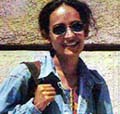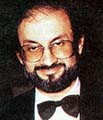The Rediff Special /Vir Sanghvi
'I think from a very early age, I was determined to negotiate with
the world on my own'
 She will concede that she was living with Gerard da Cunha, now
a celebrated architect while she was studying architecture. ''It
became clear to me that I would never become an architect,'' she
recalls. ''Can you see me going to DDA offices to get my plans
cleared?''
She will concede that she was living with Gerard da Cunha, now
a celebrated architect while she was studying architecture. ''It
became clear to me that I would never become an architect,'' she
recalls. ''Can you see me going to DDA offices to get my plans
cleared?''
But once she was virtually thrown out of home, she had no alternative
but to try and make a living on the fringes of architecture, if
only to pay the bills. She worked for an architect, helping with
drawings while da Cunha took a job with the DDA. Neither enjoyed
this kind of life much and so they decided to put out.
''We went off to Goa because we decided that we would be flower
children. We would make cake ands
sell it on the beach and make a living that away. Gerard was really
in incredible person so we could do it for seven months but then
I found I couldn't take it anymore. I couldn't take the tourists,''
she laughs. ''When I think back on all the things I have done I
think from a very early age, I was determined to negotiate with
the world on my own. There were no parents, no uncles, no aunts;
I was completely responsible for myself.''
She came back from Goa with no money. A friend had given her a
ring which she sold at a fruit juice shop for Rs 300 and a banana
shake. She took a job at the National Institute of Urban Affairs,
found a barsati near the dargah at Nizamuddin and hired a bicycle -- ''It
cost Rs 2 a day and it was better than going by bus,'' --
much to the amusement of the lepers who lived in the area. She
recalls, ''They kept expecting me to get run over and everyday
when I came back, they would say Aaj bhi bach gayi."
Pradip Krishen saw her cycling down a street and offered her a
small role in Massey Saab -- "I played the tribal bimbo" -- which
she accepted, after initial reservations, more out of curiosity
than anything else. But they had barely got to know each other
when she got a scholarship to go to Italy for eight months to
study the restoration of monuments.
Oddly enough, she says she realised she was a writer during those
months in Italy: ''I used to write to Pradip and I kept copies
of all the letters because the purpose of those letters was because
I wanted him to say, You should be a writer," she laughs.
But of course, you don't become a writer that easily. At the end
of her scholarship, she took a flight back to Delhi with no job
or future in sight. "The stewardess on the flight got talking to
me. And when she found out that I had no money, no place to go
to when I landed, she offered that I could come and share the
crew's hotel room,'' she remembers.
Nevertheless, she had finally decided what she wanted to do. She
linked up with Krishen and they planned a 21 episode television serial
for Doordarshan called the Banyan Tree. The independent production
company ITV advanced the money and shooting began on Roy's script.
Unfortunately, they had only shot enough footage for three or four
episodes when ITV changed its mind. It decided that it would rather
write off the Rs 3.5 million it had advanced Krishen and scrapped
the serial.
''That was a real heartbreak,'' she says.
A lifeline appeared in the unlikely shape of Bhaskar Ghose. He
was then director-general of Doodarshan and eager to commission
something different for the national channel. He met Roy who told
him that she wanted to write but that she didn't think anyone would
finance her kind of screenplays.
''I will,'' said Ghose. And did.
Roy wrote a script based on her experiences of university in Delhi.
It was sharp, satirical and unprecedented in the critical, unnostalgic
look it took at college life in India. Moreover, it incorporated
the fractured English of the student community. The title summed
up the tone: In Which Annie Gives It Those Ones.
Ghose liked the screenplay and commissioned a film by Krishen
and Roshan Seth agreed to star in it. Though the budget was minuscule,
it gave Krishen and Roy a chance to put her vision on the screen.
Annie got a warm critical response but Ghose had since been transferred
and the new regime at Doordarshan was horrified by the movie.
It was telecast once late at night and Roy suspects that the network
has probably lost the master cassette.
Electric Moon followed and though the movie had its fans, it was
generally deemed an honourable artistic failure. She is not inclined
to quibble with the assessment. ''The movie I had in my head and
different from the one we shot,'' she explains. ''I wanted it to
have a more anarchic quality, but I didn't know enough about cinema
to make that come through on screen.''
Even so, it did lead to Arundhati's first published piece. "When
I came back after Electric Moon, there were a lot of things that
I needed to sort out in my own mind. Writing about them was how
I coped with it. I was glad when Sunday published the piece. But
I didn't write it for people to read. I wrote if for myself.''
As reluctant as Roy is to talk about her private life, she is
even more reticent about The God of Small Things. It is not the
kind of book which has a plot that you can easily summarise.
And nor is the plot particularly important in any case.
"The great gift that Salman Rushdie has given all of us,'' she explains,
"is that people are now interested in India. It is not necessary
for us to do back flips or pirouettes to get their attention.
We can just tell our stories. In my book, I tell the whole story
in the first chapter so there is no element of trying to surprise
or ambush the reader.''
Because The God of Small Things deals with two children growing
up in Kerala in 1969, there is a temptation to see it as autobiographical.
The character of Ammu, in particular, has reminded many of Mary
Roy, Arundhati's mother. Like Ammu, she was also divorced from
her Bengali husband when the children were young.
Arundhati denies that the book is an autobiography. ''In many ways,
Ammu is totally unlike Mary Roy in the kind of person she is,''
she claims. But she accepts that's some of the experiences are
her own.
''My mother says that some of the incidents in the book are based
on things that happened when I was two years old. I have no recollection
of them. But obviously, they were trapped in some part of my brain,''
she says.
 There are probably some parallels with Midnight's Children which
used Salman Rushdie's experiences of growing up in Bombay without
becoming an autobiography. But while Rushdie was very conscious
of his status as a Great Writer after acknowledging the acclaim
that greeted Midnight's Children, Roy seems genuinely unaffected
by the praise.
There are probably some parallels with Midnight's Children which
used Salman Rushdie's experiences of growing up in Bombay without
becoming an autobiography. But while Rushdie was very conscious
of his status as a Great Writer after acknowledging the acclaim
that greeted Midnight's Children, Roy seems genuinely unaffected
by the praise.
"This is the most personal thing I have done," she says. "When you
write a screenplay, you can blame the final product on how the
actors said your lines or how the movie was shot. But with a book
you have no excuses."
Does that meant that she has finally found what she wants to do
for the rest of her life? Will she now become a full time novelist?
Arundhati Roy says she doesn't know. She never set out to plan
her life. She has never worried too much about tomorrow. And with
half a million pounds in the bank, she has less reason to worry
than ever before.
Kind courtesy: Sunday magazine
Tell us what you think of this profile
|





